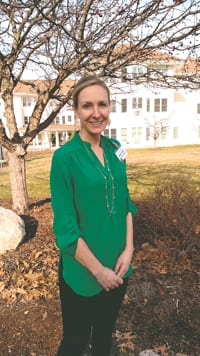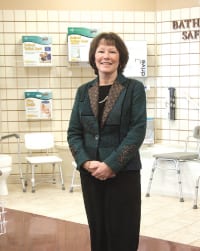Mental Health Association Agency Supports Mentally Impaired—And The Larger Community
Linda Williams, executive director of the Mental Health Assoc., sits in MHA’s still-new offices on Worthington Street in Springfield, taking in the unworn carpet, modern, glass-block walls, and bright skylights filtering natural light into the spacious building.
The business has only been at this location for three years, but the building represents a little piece of Springfield history – Williams explained that the site was once home to a city staple – Del Padre, an appliance store and part of a Western Mass. chain that operated there on the outskirts of the Hill-McKnight neighborhood, for years.
But the building had also been vacant for years, overrun with mold and slowly giving way to the ravages of time and city life.
“We had been saving for 20 years to buy offices rather than lease, and we looked at a lot of properties in order to find the right spot. But when realtors showed us around, they never brought us here,” she remembers. “There is crime in this area, and the building had been on the market for so long … so no one bothered.”
But it was a neighborhood she recalled as once great, and as MHA grew – finally able to purchase its own building after years of saving its pennies – Williams saw a chance to give back in a very different way than through support for the mentally impaired. After some extensive renovation, MHA restored the historic Del Padre site, and Williams hopes, like MHA’s repertoire of services, the location’s resurrection signals a new beginning for many people.
“I feel like we have a real opportunity here to help move the neighborhood forward,” she said.
| Fast Facts: Company: The Mental Health Association Inc. Address: 995 Worthington St., Springfield, MA 01109 Phone: (413) 734-5376 Products/services: Residential and support services for individuals with mental impairments |
Laying New Foundations
MHA, a private, not-for-profit human service agency, has been providing residential and support services for individuals with mental impairments in Hampden County since 1960. The organization’s profile is a complex one: MHA derives funding from several sources, including the Department of Mental Health, Department of Mental Retardation, Department of Public Health, Department of Social Services, Department of Housing and Urban Development (HUD), and the Mass. Rehabilitation Commission. In addition, the business employs more than 250 people, largely working directly with clients in the various communities MHA serves.
There are 225 MHA-operated residences for mentally impaired individuals, ranging from condominiums and apartments to two-family homes, which are scattered across Hampden County as far east as Palmer and as far west as Westfield. In addition to those residences, MHA’s services include 25 separate support services, including outreach programs for the homeless; a head injury program; young adult and youth in transition programs; skilled case management, offering assessment, referral, linkage, and stabilization services; drug and alcohol programs; behavioral therapy, and others.
MHA also includes a for-profit component, the Association Properties Group, or APG, incorporated in 2004 to further diversify its earnings. APG employees contract with HUD to offer maintenance and on-call services, and also work with other non-profit and community-based organizations to complete light construction and home improvement projects for a fee.
All of those aspects of the business working together have created a successful model for MHA, which, for fiscal year 2005 (ending June 30), led to $10.2 million in revenue.
That’s up from $3.5 million 10 years ago, according to Williams, and a far cry from the $500,000 budget with which she began her career with MHA in 1985. The figure also helped to land MHA on the Affiliated Chamber of Commerce’s Super 60 list for total revenue this year, but Williams said in some ways the company’s growth is bittersweet.
It means that mental health services are being brought to a greater number of people, but it also calls attention to the constant demand within those populations, she said, and the constant struggle to provide the support that is so sorely needed.
“It’s sad,” she said, “that one of our largest growth areas has been services for the homeless. Nationally, though, a priority has been placed on homeless programming, and that benefits us. We have been given greater opportunities to bring services to that population recently, through federal grants and support.”
Tearing Down Walls
Still, those services also represent a great step forward in MHA’s mission to provide comprehensive, yet flexible services. Williams said through increased funding, staff has been able to help members of the homeless population of Hampden County through outreach that quite literally takes them to street corners and under bridges, seeking out individuals.
“That gives us a place to start engaging people,” she said, “and allows us to identify mental impairments in individuals. Some are homeless because of those impairments, and others have developed problems over time due to being homeless.”
Williams added that many homeless people are not part of the traditional mental health system, because that system comes with certain rules and expectations such as regularly taking medications and abiding by curfews. Being able to reach out on their ‘own turf,’ however, provides the start of a relationship that could lead to further assistance, without overstepping personal boundaries.
For instance, one option MHA staff presents to homeless clients is Safe Havens, a specialty shelter for homeless individuals unable to use more-traditional homeless services due to mental illness. Safe Havens operates 24-hours a day, with a less-rigid set of expectations than most shelters.
“It is the next step in a continuum of care,” Williams explained, noting that offering support to a wide range of individuals in various circumstances, and functioning at various levels, is another ongoing goal of MHA.
She added, though, that growth among organizations like MHA over the years has also occurred due to the changing landscape of the U.S. mental health system. She citied the closing of several institutions both nationwide and locally, such as Northampton State Hospital and the Belchertown State School, as one major example.
“Growth for us comes in waves based on what is going on nationally,” Williams explained. “The closing of institutions created a service component in our industry that, in the past, had focused more on advocacy. When Northampton Hospital began to phase down, MHA was integral in replacing the institution with programs and support. We made the first group homes that patients were moved to, and that contributed to a growth spurt for us.
“But look at how much the system has changed since then,” she continued. “At the time of the first surge, the hospital was phasing out, but still in operation. Now it’s just an empty building. And that service model continues to grow and shift, creating the steady climb we have today.”
To further foster that uptrend in both services and revenue, Williams said that in the coming years, MHA will focus on a strategic plan that takes into account new revenue sources, self-assessment of strengths and the capitalization thereon, and cultivation of the for-profit APG corporation.
“We’re also really trying to embrace technology in order to streamline operations,” said Williams. “People can now request APG services via their computers, and we’d like to expand on that, and also create a formal database that will help us keep track of people, record services and outcomes, and overall, provide better service.”
Coming Home
Taking a quick look around MHA’s offices on Worthington Street, Williams added that it’s gratifying to see her organization breathe new life into the Hampden County community, whether out in the cities and towns or right from her desk, which sits where a piece of Springfield’s past once stood but now represents a very deliberate push toward the future.
She let her gaze settle on the window, looking outside at the Springfield neighborhood.
“It has been a pleasure to be part of something so viable,” she said.




Comments are closed.